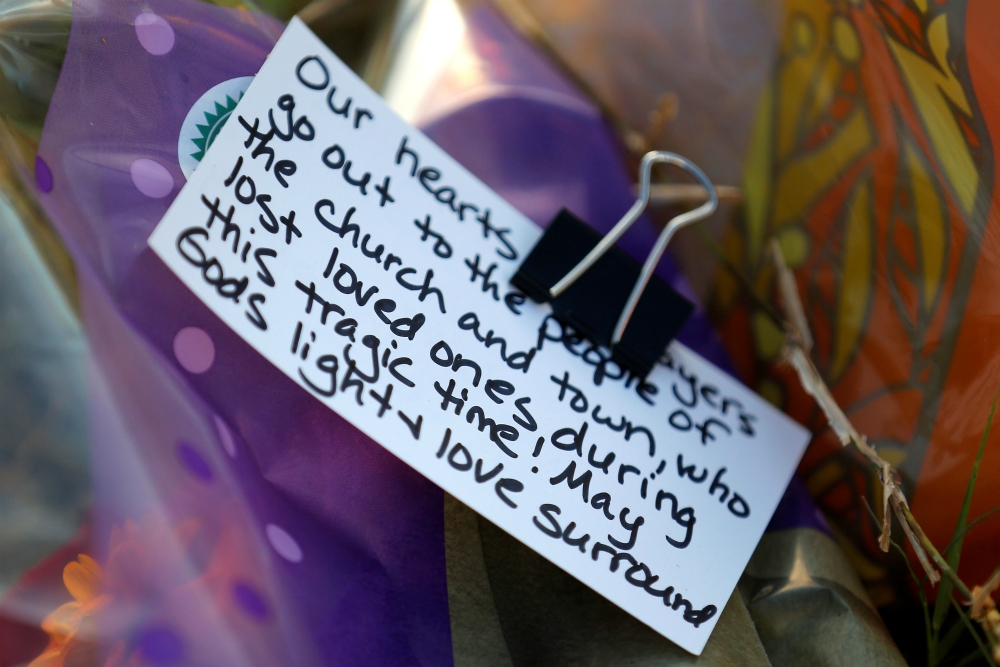
A note is seen at a memorial Nov. 7 near the site of the Nov. 5 shooting at the First Baptist Church of Sutherland Springs, Texas. (CNS/Reuters/Jonathan Bachman)
To plan church security, it's necessary to contemplate the unthinkable.
Crashing through denial is the first step in planning for secure church environments, according to Vaughn Baker, president of Strategos International, firm based in Grandview, Missouri, that prepares congregations for the unthinkable. The shooting at the First Baptist Church of Sutherland Springs, Texas, which resulted in 26 deaths on Nov. 5, has galvanized interest.
The carnage in Texas was unusual. But that very weekend, below the media radar in most of the country, a couple was shot and killed outside St. Alphonsus Church in Fresno, California, victims of domestic family violence.
Churches are vulnerable, said Baker, "because they invite the public and want to reach out to those with hurts."
The largest percentage of attacks on churches involves those with a personal connection to the congregation, which was the apparent case in Sutherland Springs. The next largest number of cases involves robberies. Toward the bottom of the list are attacks fueled by religious hatred, said Baker.
Advertisement
Baker's firm sponsors lectures around the country for churches and schools, as well as other nonprofit entities such as hospitals.
Lesson 1 is obvious. "Overcome the 'big D,' that is denial," Baker told NCR in a phone interview.
Once parishioners realize that horror can happen where they are, then specific plans can be taken. He urges congregations to increase awareness, from the parking lot to the sanctuary, about behaviors that can tip off that a troubled person intent on violence has entered a church space. The firm takes its cue from church leadership on whether to allow guns on any worship site, but Baker cautioned that allowing for guns in a security program requires intense training.
Most of Baker's church business is with Protestant congregations, although he has worked with the Archdiocese of Kansas City, Kansas. Catholic parishes are not immune to threats or fear of threats.
Soon after the Texas shooting, Catholic dioceses urged prayers for the victims and promised renewed studies of security measures.
While Jesus may have said that he who lives by the sword dies from it, there has been ambiguous reaction in some church circles about firearms intended for protection.
The Dallas Diocese, which barred firearms from its premises last year, reaffirmed its policy prohibiting the possession of guns on church property. But Bishop Edward Burns asked that parishes remove signs publicizing the prohibition in case, according to a diocesan statement, there be "any perception that any of our parishes would be an easy target for terror."
St. William Church in Murphy, North Carolina, implemented a security policy last year, before the Sutherland Springs attack. The parish, part of the Charlotte Diocese, is located in the western North Carolina mountains and has about 235 registered families.
A committee led by parishioner Marie Keffer formulated a set of policies intended to protect a parish filled largely with retirees.
"I said to myself we are so vulnerable here," said Keffer. The parish installed a series of "panic buttons" so that volunteers can immediately summon help from local police in case of an incident.
Volunteers, such as ushers or choir members, are positioned near the panic buttons at church services. Security cameras also monitor the grounds.
Keffer noted a recent inadvertent test proved successful. A false alarm when a panic button was pushed resulted in a police response within three minutes.
While it is not spelled out in the plan, St. William does unofficially rely on parishioners who are licensed by the state to carry weapons. In the mountains of western North Carolina, guns are a part of the culture, and parishioners who are licensed to carry weapons are regularly attendees at Mass, said Keffer.
[Peter Feuerherd reports on parish issues for NCR's Field Hospital blog. He previously worked as director of communications for the Diocese of Camden, New Jersey.]
We can send you an email alert every time The Field Hospital is posted. Go to this page and follow directions: Email alert sign-up.








